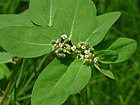Note: This is a project under development. The articles on this wiki are just being initiated and broadly incomplete. You can Help creating new pages.
Difference between revisions of "Euphorbia hypericifolia"
| Line 1: | Line 1: | ||
[[File:Black Purslane (4826220435).jpg|thumb|right]] | [[File:Black Purslane (4826220435).jpg|thumb|right]] | ||
| + | '''Euphorbia hypericifolia''' is an annual or perennial plant with spreading or erect branches. It can grow up to 60cm tall. The plant is commonly used in many parts of the world in the treatment of a wide variety of gastro-intestinal disorders. It is widely traded in the United States, in both tablet and powder form, mainly to treat bowel disorders. It is also traded internationally through the internet. | ||
==Uses== | ==Uses== | ||
| − | {{Uses|}}, {{Uses|}}, {{Uses|}}, {{Uses|}}, {{Uses|}}, {{Uses|}}, {{Uses|}}, {{Uses|}}, {{Uses|}}, {{Uses| | + | {{Uses|Gonorrhoea}}, {{Uses|Menorrhagia}}, {{Uses|Leucorrhoea}}, {{Uses|Pneumonia}}, {{Uses|Bronchitis}}, {{Uses|Cuts}}, {{Uses|Wounds}}, {{Uses|Headache}}, {{Uses|Dysentery}}, {{Uses|Colic}}.<ref name="Uses"/> |
==Parts Used== | ==Parts Used== | ||
| Line 29: | Line 30: | ||
==Habit== | ==Habit== | ||
| − | {{Habit|}} | + | {{Habit|Perennial}} |
==Identification== | ==Identification== | ||
| Line 48: | Line 49: | ||
==Mode of Propagation== | ==Mode of Propagation== | ||
| − | {{Propagation|}} | + | {{Propagation|Seeds}} |
==How to plant/cultivate== | ==How to plant/cultivate== | ||
| − | <ref name="How to plant/cultivate"/> | + | Originally from tropical America, the plant has spread as a weed into many areas of the tropics.<ref name="How to plant/cultivate"/> |
==Commonly seen growing in areas== | ==Commonly seen growing in areas== | ||
| − | {{Commonly seen|}}, {{Commonly seen|}}, {{Commonly seen| | + | {{Commonly seen|Along roadsides}}, {{Commonly seen|Stony river sides}}, {{Commonly seen|Waste places}}. |
==Photo Gallery== | ==Photo Gallery== | ||
| Line 66: | Line 67: | ||
<references> | <references> | ||
| − | <ref name="chemical composition">[ | + | <ref name="chemical composition">[Chemistry]</ref> |
| − | <ref name="Leaf">[ | + | <ref name="Leaf">[Morphology]</ref> |
| − | <ref name="How to plant/cultivate">[ | + | <ref name="How to plant/cultivate">[http://tropical.theferns.info/viewtropical.php?id=Euphorbia+hypericifolia Cultivation]</ref> |
<ref name="Uses">Indian Medicinal Plants by C.P.Khare</ref> | <ref name="Uses">Indian Medicinal Plants by C.P.Khare</ref> | ||
</references> | </references> | ||
==External Links== | ==External Links== | ||
| − | * [ ] | + | * [http://www.missouribotanicalgarden.org/PlantFinder/PlantFinderDetails.aspx?kempercode=c901 Euphorbia hypericifolia on missouribotanicalgarden.org] |
| − | * [ ] | + | * [http://www.flowersofindia.net/catalog/slides/Graceful%20Sandmat.html Euphorbia hypericifolia on flowersofindia.net] |
| − | * [ ] | + | * [https://www.thespruce.com/euphorbia-hypericifolia-1402841 Euphorbia hypericifolia on thespruce.com] |
[[Category:Herbs]] | [[Category:Herbs]] | ||
[[Category:Pages without herbs images]] | [[Category:Pages without herbs images]] | ||
Revision as of 16:29, 5 May 2020
Euphorbia hypericifolia is an annual or perennial plant with spreading or erect branches. It can grow up to 60cm tall. The plant is commonly used in many parts of the world in the treatment of a wide variety of gastro-intestinal disorders. It is widely traded in the United States, in both tablet and powder form, mainly to treat bowel disorders. It is also traded internationally through the internet.
Contents
- 1 Uses
- 2 Parts Used
- 3 Chemical Composition
- 4 Common names
- 5 Properties
- 6 Habit
- 7 Identification
- 8 List of Ayurvedic medicine in which the herb is used
- 9 Where to get the saplings
- 10 Mode of Propagation
- 11 How to plant/cultivate
- 12 Commonly seen growing in areas
- 13 Photo Gallery
- 14 References
- 15 External Links
Uses
Gonorrhoea, Menorrhagia, Leucorrhoea, Pneumonia, Bronchitis, Cuts, Wounds, Headache, Dysentery, Colic.[1]
Parts Used
[[:Category:Herbs with used in medicine|]], stem, leaves, Root.
Chemical Composition
Common names
| Language | Common name |
|---|---|
| Kannada | |
| Hindi | |
| Malayalam | |
| Tamil | |
| Telugu | |
| Marathi | |
| Gujarathi | |
| Punjabi | |
| Kashmiri | |
| Sanskrit | |
| English |
Properties
Reference: Dravya - Substance, Rasa - Taste, Guna - Qualities, Veerya - Potency, Vipaka - Post-digesion effect, Karma - Pharmacological activity, Prabhava - Therepeutics.
Dravya
Rasa
Guna
Veerya
Vipaka
Karma
Prabhava
Habit
Identification
Leaf
| Kind | Shape | Feature |
|---|---|---|
Flower
| Type | Size | Color and composition | Stamen | More information |
|---|---|---|---|---|
| {{{5}}} |
Fruit
| Type | Size | Mass | Appearance | Seeds | More information |
|---|---|---|---|---|---|
Other features
List of Ayurvedic medicine in which the herb is used
Where to get the saplings
Mode of Propagation
How to plant/cultivate
Originally from tropical America, the plant has spread as a weed into many areas of the tropics.[4]
Commonly seen growing in areas
Along roadsides, Stony river sides, Waste places.
Photo Gallery
References
- ↑ Indian Medicinal Plants by C.P.Khare
- ↑ [Chemistry]
- ↑ [Morphology]
- ↑ Cultivation
External Links
- Ayurvedic Herbs known to be helpful to treat Gonorrhoea
- Ayurvedic Herbs known to be helpful to treat Menorrhagia
- Ayurvedic Herbs known to be helpful to treat Leucorrhoea
- Ayurvedic Herbs known to be helpful to treat Pneumonia
- Ayurvedic Herbs known to be helpful to treat Bronchitis
- Ayurvedic Herbs known to be helpful to treat Cuts
- Ayurvedic Herbs known to be helpful to treat Wounds
- Ayurvedic Herbs known to be helpful to treat Headache
- Ayurvedic Herbs known to be helpful to treat Dysentery
- Ayurvedic Herbs known to be helpful to treat Colic
- Herbs with used in medicine
- Herbs with stem used in medicine
- Herbs with leaves used in medicine
- Herbs with Root used in medicine
- Habit - Perennial
- Index of Plants which can be propagated by Seeds
- Herbs that are commonly seen in the region of Along roadsides
- Herbs that are commonly seen in the region of Stony river sides
- Herbs that are commonly seen in the region of Waste places
- Herbs
- Pages without herbs images



